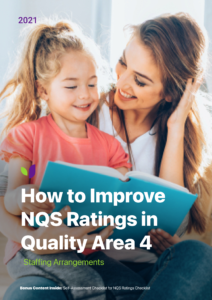The National Quality Standard Quality Area 4 (QA4), Staffing Arrangements, underscores the importance of having qualified and experienced staff in early childcare services. Educators, coordinators and supervisors must be able to develop warm, respectful relationships with children, create safe and predictable environments and encourage children’s active engagement in the learning program.
Hiring staff that meet national regulations
For centre-based childcare services, at least 50% of educators must be diploma level qualified or higher. All other educators must be certificate III level qualified. Services must also have access to an Early Childhood Teacher (ECT) who possesses approved early childhood teacher qualifications.
Additionally, for Family Day Care, all educators must hold (or be actively working towards) an approved certificate III level education and care qualification. Coordinators must hold an approved diploma level education and care qualification.
There are also national first aid requirements for services. Centre-based and Outside of School Hours Care (OSHC) must have at least one staff member or nominated supervisor with up-to-date approved first aid qualification, anaphylaxis management training, and up-to-date asthma management training in any place where children are being educated or cared for. As for Family Day Cares, they must ensure each educator and assistant registered with the service holds up-to-date approved first aid qualification, has taken up-to-date asthma management training and anaphylaxis management training.
The day-to-day running of centres
Providers must have at least one nominated supervisor. Nominated supervisors may be required to successfully complete child protection training—depending on the jurisdiction. The nominated supervisor is responsible for the day-to-day running of the service.
Their responsibilities include, but are not limited to:
- Ensuring educational programs adhere to an approved learning framework
- Ensuring children are adequately supervised and kept safe
- Regulating who does and doesn’t have access to the service premises
- Ensuring that provided food and beverages are healthy and prepared hygienically
- Ensuring only authorised medicine is administered to children
- Ensuring no staff caring for children are under the influence of alcohol, drugs or prescription drugs that may impair their ability to provide adequate care to children
- Conducting risk assessments before any centre excursions
- Ensuring that educator-to-child ratios are maintained
Quality and quantity matter
Meeting the minimum educator-to-child ratio is just as important as having qualified educators. These ratios aim to ensure the safety and welfare of all children. According to studies, an adequate number of educators correlates to quality interactions and positive learning outcomes for children. The educator-to-child ratio also helps ensure educators get to know children in their care better, including understanding their individual preferences and developmental needs.

Educator-to-child ratios:
- Apply to all areas and rooms within the service.
- Apply during pick up, drop off and while children are being transported under the care of the service. It may be necessary to have extra staff on hand during these busy times.
- Apply during break times and scheduled administration tasks (educators are NOT included in ratios).
- Vary by service type and age range.
Keep your staff and invest in them
Interacting with the same educators daily helps children develop strong bonds with them. Constant interaction enables educators to understand each child’s individual interests, strengths and areas where they may need support. This is why the continuity of staff is a critical factor that contributes to a child’s learning and development.
Children who feel comfortable with educators will help improve your QA4 assessment. Assessors want to see children happily interact with educators and feel comfortable initiating conversations and interactions. Bonds like these take time to develop, so constant staffing changes may make it difficult for children to feel comfortable with their carers.
This is also a consideration when getting relief educators. Your centre must exert an effort to draw from the same pool that children are familiar with. During busy times such as drop off and pick up, do your best to schedule the same extra helpers.
According to the Early Years Research 2020 Report, services with Exceeding ratings typically invest 13% more in staff costs. A service that values and supports its staff is more likely to retain quality educators. Having staff that are continually looking to develop as professionals will benefit children, as well as your ratings.
Part of the NQS cycle is critical reflection and improvement. If staff are reflecting on weak areas in their training and seek to improve in those areas, the benefits will transfer directly to the children. This will show assessors your centre and staff are working towards constant improvement.
The new generation of educators entering the childcare field are more tech-savvy and they maximise software solutions that make their jobs easier. Information stored in a secure cloud-based system is easily shared with fellow educators and parents. Other tasks that can be tedious when done manually can be efficiently streamlined with a suitable suite of software tools.
Learn more about the importance of experienced and qualified staff at your centres in our guide, How to Improve NQS Ratings in Quality Area 4.
Bonus content in the guide: A handy self-assessment checklist to prepare your staff for the Assessment and Rating process.


by QikKids (Marketing Team Lead)
-
First published: 25 March 2022
Written by: Dean Comeau

